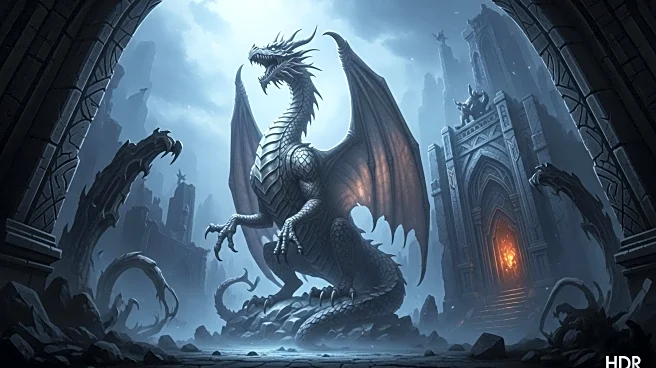What's Happening?
Square Enix, along with developer Artdink Corporation, has released new information about the Dragon Quest I & II HD-2D Remake, highlighting new scenarios, encounters, and dungeons in Dragon Quest I. The remake aims to deepen the connection within the Erdrick Trilogy by introducing numerous added scenarios. Players will seek the aid of Rubiss, a great spirit said to have created Alefgard, to save the world from darkness. The game features encounters with new characters and events, enhancing the original story. Additionally, new dungeons and formidable foes have been introduced, offering players a more dynamic adventure as they explore Alefgard.
Why It's Important?
The release of Dragon Quest I & II HD-2D Remake is significant for fans of the series and the gaming industry. By adding new scenarios and encounters, Square Enix is revitalizing a classic game, potentially attracting both new players and long-time fans. The enhancements could lead to increased sales and engagement, benefiting the company financially. Moreover, the remake contributes to the preservation and modernization of classic games, ensuring their relevance in today's gaming landscape. This move may influence other developers to invest in remakes of beloved titles, impacting the industry’s approach to game development.
What's Next?
As the release date approaches, Square Enix is likely to continue promoting the game through trailers and gameplay previews to build anticipation. The gaming community may respond with reviews and discussions, influencing the game's reception and sales. Post-launch, Square Enix might consider additional updates or expansions based on player feedback, further enhancing the game experience. The success of this remake could encourage the company to explore similar projects, potentially leading to more remakes of classic games in the future.
Beyond the Headlines
The remake of Dragon Quest I & II not only revitalizes a classic but also raises questions about the balance between preserving original content and introducing new elements. The ethical considerations of altering a beloved game while maintaining its core essence are significant. Additionally, the cultural impact of reintroducing classic games to a new generation may foster appreciation for gaming history and its evolution. This development could also influence the gaming community's expectations for future remakes, emphasizing the importance of innovation while respecting original narratives.









